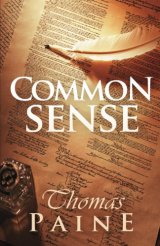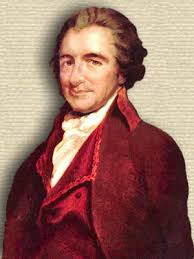Common Sense Page #5
Common Sense is a pamphlet written by Thomas Paine in 1775–1776 advocating independence from Great Britain to people in the Thirteen Colonies. Writing in clear and persuasive prose, Paine marshaled moral and political arguments to encourage common people in the Colonies to fight for egalitarian government.
As to usurpation, no man will be so hardy as to defend it; and that William the Conqueror was an usurper is a fact not to be contradicted. The plain truth is, that the antiquity of English monarchy will not bear looking into. But it is not so much the absurdity as the evil of hereditary succession which concerns mankind. Did it ensure a race of good and wise men it would have the seal of divine authority, but as it opens a door to the foolish, the wicked, and the improper, it hath in it the nature of oppression. Men who look upon themselves born to reign, and others to obey, soon grow insolent; selected from the rest of mankind their minds are early poisoned by importance; and the world they act in differs so materially from the world at large, that they have but little opportunity of knowing its true interests, and when they succeed to the government are frequently the most ignorant and unfit of any throughout the dominions. Another evil which attends hereditary succession is, that the throne is subject to be possessed by a minor at any age; all which time the regency, acting under the cover of a king, have every opportunity and inducement to betray their trust. The same national misfortune happens, when a king worn out with age and infirmity, enters the last stage of human weakness. In both these cases the public becomes a prey to every miscreant, who can tamper successfully with the follies either of age or infancy. The most plausible plea, which hath ever been offered in favour of hereditary succession, is, that it preserves a nation from civil wars; and were this true, it would be weighty; whereas, it is the most barefaced falsity ever imposed upon mankind. The whole history of England disowns the fact. Thirty kings and two minors have reigned in that distracted kingdom since the conquest, in which time there have been (including the Revolution) no less than eight civil wars and nineteen rebellions. Wherefore instead of making for peace, it makes against it, and destroys the very foundation it seems to stand on. The contest for monarchy and succession, between the houses of York and Lancaster, laid England in a scene of blood for many years. Twelve pitched battles, besides skirmishes and sieges, were fought between Henry and Edward. Twice was Henry prisoner to Edward, who in his turn was prisoner to Henry. And so uncertain is the fate of war and the temper of a nation, when nothing but personal matters are the ground of a quarrel, that Henry was taken in triumph from a prison to a palace, and Edward obliged to fly from a palace to a foreign land; yet, as sudden transitions of temper are seldom lasting, Henry in his turn was driven from the throne, and Edward recalled to succeed him. The parliament always following the strongest side. This contest began in the reign of Henry the Sixth, and was not entirely extinguished till Henry the Seventh, in whom the families were united. Including a period of 67 years, viz. from 1422 to 1489. In short, monarchy and succession have laid (not this or that kingdom only) but the world in blood and ashes. 'Tis a form of government which the word of God bears testimony against, and blood will attend it. If we inquire into the business of a king, we shall find that in some countries they have none; and after sauntering away their lives without pleasure to themselves or advantage to the nation, withdraw from the scene, and leave their successors to tread the same idle round. In absolute monarchies the whole weight of business, civil and military, lies on the king; the children of Israel in their request for a king, urged this plea "that he may judge us, and go out before us and fight our battles." But in countries where he is neither a judge nor a general, as in England, a man would be puzzled to know what is his business. The nearer any government approaches to a republic the less business there is for a king. It is somewhat difficult to find a proper name for the government of England. Sir William Meredith calls it a republic; but in its present state it is unworthy of the name, because the corrupt influence of the crown, by having all the places in its disposal, hath so effectually swallowed up the power, and eaten out the virtue of the house of commons (the republican part in the constitution) that the government of England is nearly as monarchical as that of France or Spain. Men fall out with names without understanding them. For it is the republican and not the monarchical part of the constitution of England which Englishmen glory in, viz. the liberty of choosing a house of commons from out of their own body--and it is easy to see that when republican virtue fails, slavery ensues. Why is the constitution of England sickly, but because monarchy hath poisoned the republic, the crown hath engrossed the commons? In England a king hath little more to do than to make war and give away places; which in plain terms, is to impoverish the nation and set it together by the ears. A pretty business indeed for a man to be allowed eight hundred thousand sterling a year for, and worshipped into the bargain! Of more worth is one honest man to society and in the sight of God, than all the crowned ruffians that ever lived. THOUGHTS ON THE PRESENT STATE OF AMERICAN AFFAIRS. In the following pages I offer nothing more than simple facts, plain arguments, and common sense; and have no other preliminaries to settle with the reader, than that he will divest himself of prejudice and prepossession, and suffer his reason and his feelings to determine for themselves; that he will put on, or rather that he will not put off, the true character of a man, and generously enlarge his views beyond the present day.
Translation
Translate and read this book in other languages:
Select another language:
- - Select -
- 简体中文 (Chinese - Simplified)
- 繁體中文 (Chinese - Traditional)
- Español (Spanish)
- Esperanto (Esperanto)
- 日本語 (Japanese)
- Português (Portuguese)
- Deutsch (German)
- العربية (Arabic)
- Français (French)
- Русский (Russian)
- ಕನ್ನಡ (Kannada)
- 한국어 (Korean)
- עברית (Hebrew)
- Gaeilge (Irish)
- Українська (Ukrainian)
- اردو (Urdu)
- Magyar (Hungarian)
- मानक हिन्दी (Hindi)
- Indonesia (Indonesian)
- Italiano (Italian)
- தமிழ் (Tamil)
- Türkçe (Turkish)
- తెలుగు (Telugu)
- ภาษาไทย (Thai)
- Tiếng Việt (Vietnamese)
- Čeština (Czech)
- Polski (Polish)
- Bahasa Indonesia (Indonesian)
- Românește (Romanian)
- Nederlands (Dutch)
- Ελληνικά (Greek)
- Latinum (Latin)
- Svenska (Swedish)
- Dansk (Danish)
- Suomi (Finnish)
- فارسی (Persian)
- ייִדיש (Yiddish)
- հայերեն (Armenian)
- Norsk (Norwegian)
- English (English)
Citation
Use the citation below to add this book to your bibliography:
Style:MLAChicagoAPA
"Common Sense Books." Literature.com. STANDS4 LLC, 2024. Web. 25 Nov. 2024. <https://www.literature.com/book/common_sense_270>.




Discuss this Common Sense book with the community:
Report Comment
We're doing our best to make sure our content is useful, accurate and safe.
If by any chance you spot an inappropriate comment while navigating through our website please use this form to let us know, and we'll take care of it shortly.
Attachment
You need to be logged in to favorite.
Log In